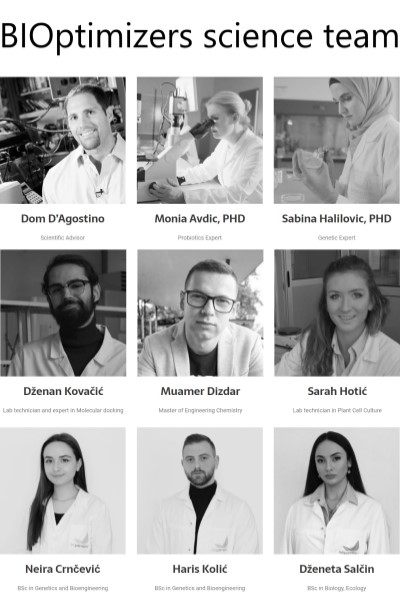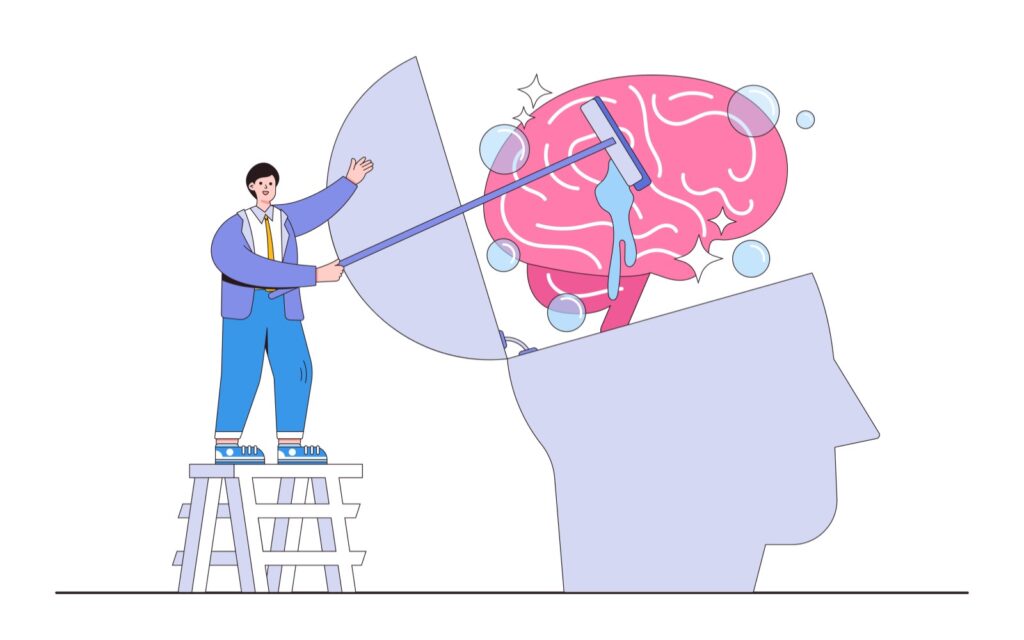
Undoubtedly, your brain stands as the most vital organ within your body. It not only facilitates the process of thinking but also plays a crucial role in sustaining your life by overseeing various functions, ranging from respiration and heartbeat to digestion, through the intricate nervous system.
Regrettably, the contemporary diet, lifestyle and environment pose challenges to the well-being of our nervous system. Consequently, a significant number of individuals fail to attain their optimal levels of cognitive function, happiness and overall health. Conditions such as brain fog, premature cognitive decline and mental health issues are on the rise, but it’s important to note that these are neither typical nor conducive to a healthy state.
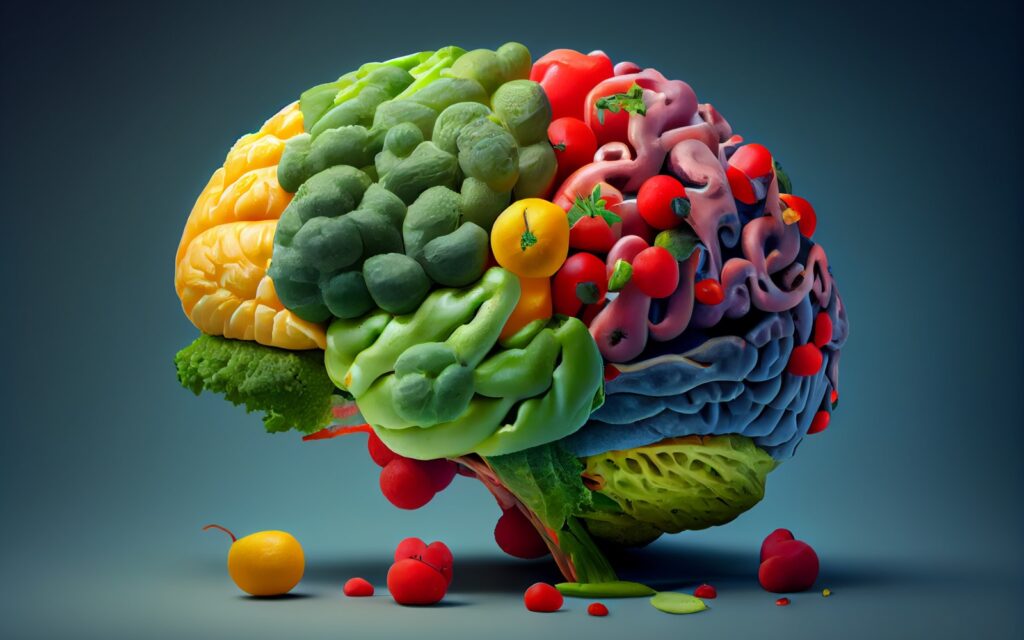
The good news is that:
1. You have the power to not follow the status quo and
2. Once you’re aware of this, there are many things you can do to mitigate the negative effects and reach your full potential.
Similar to the way you can enhance your brain and enrich it with intriguing information, daily encounters with certain events can also have a negative impact. This article will delve into the reasons why the majority of individuals require and can benefit from brain-enhancing supplements.
The Collective Mental And Cognitive Health Are Declining
From 2007 to 2017, there was a 13% increase in the occurrence of mental health disorders and substance abuse [1]. This trend may be attributed to the growing influence of technology, a heightened preference for a faster-paced lifestyle and a diminishing amount of time allocated for relaxation.
Furthermore, there has been an elevated risk for the emergence of anxiety and depression disorders as of the year 2020. [2]
Recent occurrences like the pandemic, racial disparities and conflicts have significantly affected both mental and physical health. Conversely, the global stigmatization surrounding mental health issues and disorders also presents a substantial drawback.
At present, approximately 500 million individuals are impacted by mental health issues, contributing to up to 50% of all disability cases [3].
To boost the state of your mental health, you can try:
• Reducing social media and news consumption
• Meditation and self-reflection
• Open communication about your concerns with a person of trust.[4]

Here Are The 8 Reasons You Should Try Supplements To Improve Brain Function
1. Modern-Day Stress And Traumas
A certain amount of stress is necessary for survival, but it’s the persistent, unyielding stress that can negatively impact your brain and compromise your health. While our bodies are equipped to handle stressors we can physically escape from, challenges like job interviews, exams or economic concerns are situations we can’t simply run away from.
We are aware that stress has an impact on our mental well-being and it also directly influences our brain.
Here is what stress can do to your brain:
• Reduced neuroplasticity – disruption in your brain’s reorganization of function and structure, reducing your ability to learn and adapt
• Decrease in size, especially in the hippocampus (memory centre), causing memory problems
• Altered emotional and behavioural responses [5]
• Affected gut microbiota, which influences the brain [6]
• Increased risk of Parkinson’s and other neurological diseases
Eliminating stress entirely is nearly impossible, making it crucial to acquire skills in processing and approaching obstacles differently. Fortunately, the key lies less in the stress itself affecting your health and more in how you perceive it. Engaging in practices such as meditation and yoga can enhance your stress resilience.
Our mood-enhancing supplement, Cognibiotics, is designed to promote healthy stress resilience and balance the stress response by influencing the gut-brain-microbiota axis.

2. Air Pollution And Toxic Exposure
We encounter polluted air daily, emanating from various sources such as vehicles, industrial factories, and power plants. This smog, laden with toxic compounds and cancer-causing molecules, poses a threat to both our respiratory health and the overall well-being of the Earth. Unfortunately, it also has adverse effects on the brain.
Studies involving animals and epidemiology have indicated that exposure to air pollution may contribute to the following:
• Depression
• Brain cancers [8]
• Inflammation
• Neurodegenerative diseases
• Neurodevelopmental disorders, such as Autism spectrum disorders [9]
• Disruptions in brain structure in a developing foetus (prenatal exposure)
• Decreased brain networks (early childhood and adolescence exposure) [10]
• Dementia [11]
To mitigate the adverse effects of pollutants and toxins, you can move to a less polluted location. However, practical constraints related to work and family may limit this possibility. If you reside in a heavily polluted region, it’s advisable to invest in a high-quality air purifier capable of reducing harmful airborne microbes, chemicals and particulate matter.
Additionally, ensure that you bolster your body and brain’s detoxification and antioxidant capabilities on a daily basis by prioritizing sufficient sleep, maintaining a nutritious diet, and engaging in regular physical activity to induce sweating. Certain supplements, like N-acetylcysteine and sulforaphane, function as antioxidants while also supporting detoxification pathways. Incorporating these supplements into your routine can aid in the detoxification of pollutants and help mitigate their adverse health effects.

3. Nutrient Deficiencies
The contemporary food chain often lacks many essential nutrients crucial for optimal brain function. Consequently, it is generally advantageous to incorporate supplements containing the following nutrients.
Omega-3 Fatty Acids
Omega-3 fatty acids are very important for the brain.[12] Omega-3 fatty acid deficiencies can cause cognitive dysfunctions, disrupt brain development, and chemically change your brain cells.[13] It can also increase overall inflammation in the body.
Fish and seafood are expected to serve as reliable sources of preformed Omega-3, specifically docosahexaenoic acid (DHA) and eicosapentaenoic acid (EPA). Nevertheless, a considerable portion of these foods, particularly the more affordable options, are often farm-raised and given diets primarily composed of corn and soy. Consequently, they may not be rich in Omega-3. To obtain an adequate supply of Omega-3, it is advisable to opt for fatty wild-caught fish or choose farmed fish that are fed meals containing high levels of Omega-3.
Numerous fish varieties, particularly larger ones and those occupying higher positions in the food chain, often contain elevated levels of heavy metals and other contaminants from the ocean. These contaminants can have adverse effects on both your brain and overall health. Therefore, it is advisable to prioritize smaller fish options, such as sardines, to minimize exposure to these potential health risks.
Considering the challenges in obtaining sufficient Omega-3 through dietary means, opting for an Omega-3 supplement can often be a more cost-effective and safer alternative. It is crucial to choose high-quality supplements that are pure and undergo thorough testing for contaminants. [14] Also, magnesium promotes relaxation and improves sleep.[15]
Magnesium
Magnesium stands as a vital mineral participating in more than 300 biochemical reactions throughout the body and brain. Deficiency in magnesium is associated with diminished brain functions and mental health indicators. In numerous instances, incorporating daily magnesium supplementation has shown potential to enhance mood and mental well-being.
Choline
Choline is an important building block of your cell membranes and key neurotransmitter, acetylcholine. [16] Low intake of choline and reduced acetylcholine levels have been linked to some neurodegenerative diseases and cognitive decline. In general, choline plays a vital role in regulating cognitive function and mental health. [17]
Opting for a whole food diet can provide the necessary choline boost, particularly if you emphasize foods such as chicken liver, eggs, salmon, quinoa and cruciferous vegetables [18].
Amino Acids
Amino acids serve as the foundational components of proteins and neurotransmitters, which are chemicals responsible for transmitting neuronal signals. These substances play a crucial role in regulating cognition and mood. [19]
Essential amino acids must be obtained through food or supplements, as the body cannot produce them independently. Once acquired, these essential amino acids are utilized to synthesize non-essential ones within the body. Examples of such non-essential amino acids include glutamate and glycine, both of which serve as neurotransmitters.
Insufficient amino acids can result in a depletion of neurotransmitters in the brain, leading to diminished cognitive performance. Animal-derived products, particularly tissue and organ meat, are abundant sources of amino acids. Nonetheless, amino acids can also be obtained from whole grains, legumes, and plant-based diets, especially when supplemented. [20]

Vitamins And Minerals
Various vitamins and minerals play a significant role in supporting brain function and health. Deficiencies in Vitamin B, for example, can contribute to the onset of conditions such as depression, dementia, and cognitive dysfunction. [21] A diet rich in fruits and vegetables is a great solution.
4. Not Enough Sleep And Poor Sleep Quality
In the present day, numerous individuals grapple with sleep-related challenges or unknowingly experience suboptimal sleep. Some find it difficult to sleep, others oversleep, and some have become accustomed to unhealthy sleep schedules.
Sleep is essential for both your brain and body. You are refreshing your brain, giving it time to repair and reprocess.
While you are asleep, your glymphatic system works to eliminate beta-amyloids and excess waste products from neurons. This crucial process occurs primarily during deep sleep. In addition to waste management, the glymphatic system also facilitates the distribution of vital molecules throughout the brain, such as amino acids, lipids, and glucose. [22]
Sleep plays a crucial role in memory consolidation and various brain regenerative processes. [23] This underscores the biological significance of sleep across a wide range of animal species.
Not surprisingly, poor sleep can contribute to the risk of:
• Cognitive impairment [24]
• Aggressive behaviour and emotional instability [25]
• Depression [26]
• Working memory reduction [27]
• Alzheimer’s disease [28]
• Lack of focus
• Inflammation [29]
• Oxidative stress [30]

To improve your sleep quality, consider the following:
• Use relaxing supplements before bed
• Meditate for 5-15 minutes before bed to calm your body and your mind. Practicing meditation before sleep will lead to relaxation and easier entrance into the deep sleep phase, allowing maximum repair and rest.
• Use mattresses that complement your sleeping positions and body type. To avoid tossing and turning due to uncomfortable beds or positions, find a mattress that contains just the right amount of firmness. Some people prefer softer mattresses to support their bodies during the night, while others prefer firmer. Being comfortable is crucial.
• Time your meals appropriately (eat 3 – 4 hours before bed)
A primary factor contributing to contemporary sleep challenges is disruptions in circadian rhythm. Even if one manages to sleep under these conditions, it can still impact the functioning of the brain.
5. Circadian Rhythm Disruptions
The circadian rhythm is akin to an internal clock pendulum within your body, orchestrating all the fluctuations that take place over a 24-hour period based on the internal sleep-wake clock. These changes, encompassing both physical and psychological aspects, are influenced by factors such as light exposure, eating, movement, sleep, darkness and more.
Numerous contemporary lifestyle factors, including artificial light and insufficient sun exposure, have the potential to disturb your circadian rhythm.
Sunlight holds a primary role in regulating the circadian rhythm. Nevertheless, the demands of daily obligations and job responsibilities often hinder us from obtaining sufficient sun exposure. Naturally, this directly impacts an individual’s circadian rhythm.
The primary origin of blue light is sunlight. This type of light, with its longer wavelength, suppresses melatonin production, contributing to a heightened sense of alertness and wakefulness.
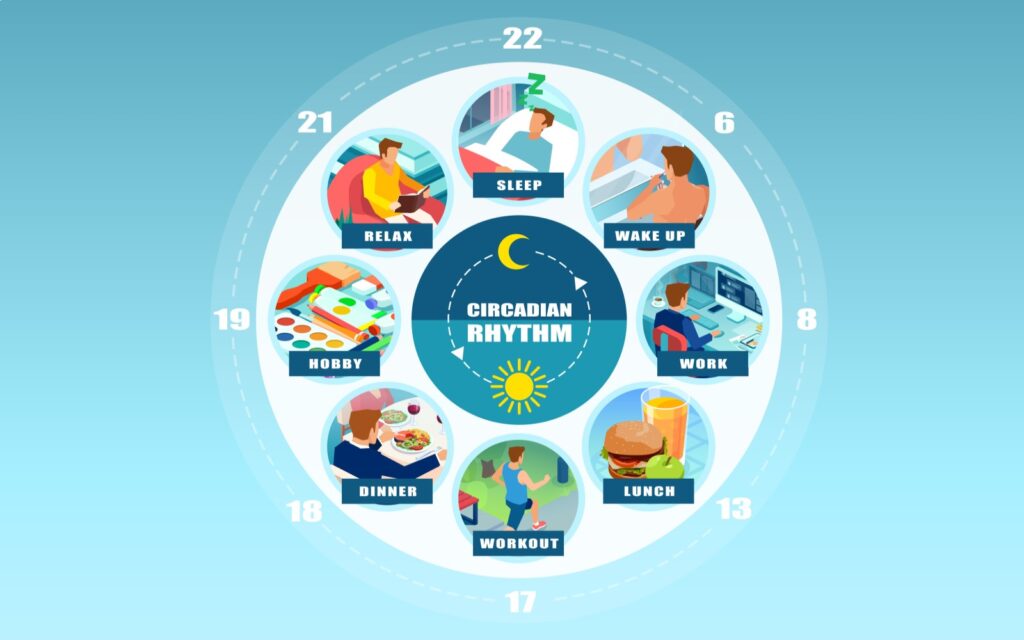
Moreover, the prevalence of blue light exposure has increased during nighttime, primarily stemming from devices like TVs, smartphones, and LED lights. The shorter wavelengths of this blue light are considered harmful, leading to potential issues such as eye strain and retinal damage. Such exposure can disrupt your body’s internal clock, potentially hastening brain aging and adversely affecting cognitive performance over time. [31]
Individuals grappling with an unhealthy circadian rhythm and sleep often attempt to compensate for sleep deficiency with caffeine. However, it’s crucial to note that coffee cannot serve as a substitute for sleep; rather, it merely hinders your ability to feel tired or initiate sleep.
Here are some tips on how to improve your sleep and circadian rhythm:
• Limit the unhealthy blue light exposure, especially before bed and through the night. Avoid watching lots of TV or videos on your phone before bed. If you limit the exposure to light, melatonin is secreted. This will regulate your circadian rhythm and tell your body that it’s time to sleep.
• You can also use blue blocker glasses. These will reduce eye strain and negative effects of unhealthy blue light.
• Increase the exposure to healthy blue light in the morning. In contrast, sunlight or light alarms will send a signal to your body that it’s time to wake up.
6. Oxidative Stress
Oxidative stress is linked to an imbalance between prooxidants (free radicals, which are oxygen-carrying molecules with an uneven number of electrons) and antioxidants. [32]
Mitochondria, the cellular powerhouses, are particularly susceptible to oxidative damage. Oxidative stress can disrupt energy production in mitochondria and harm mitochondrial DNA, creating a cycle that generates further oxidative stress. [33]
Given the high demand for oxygen and energy, our brains are highly vulnerable to oxidative stress. Elevated oxidative stress in the brain can lead to symptoms like brain fog and fatigue, eventually resulting in damage to the neurons.
Over time, oxidative stress can contribute to (though not the sole cause of):
• Brain aging
• Brain fog
• Neurodegenerative diseases (Alzheimer’s and Parkinson’s disease)
• Brain inflammation [34]
• Insulin resistance [35]
Aside from other health tips in this article, the following can help you address oxidative stress:
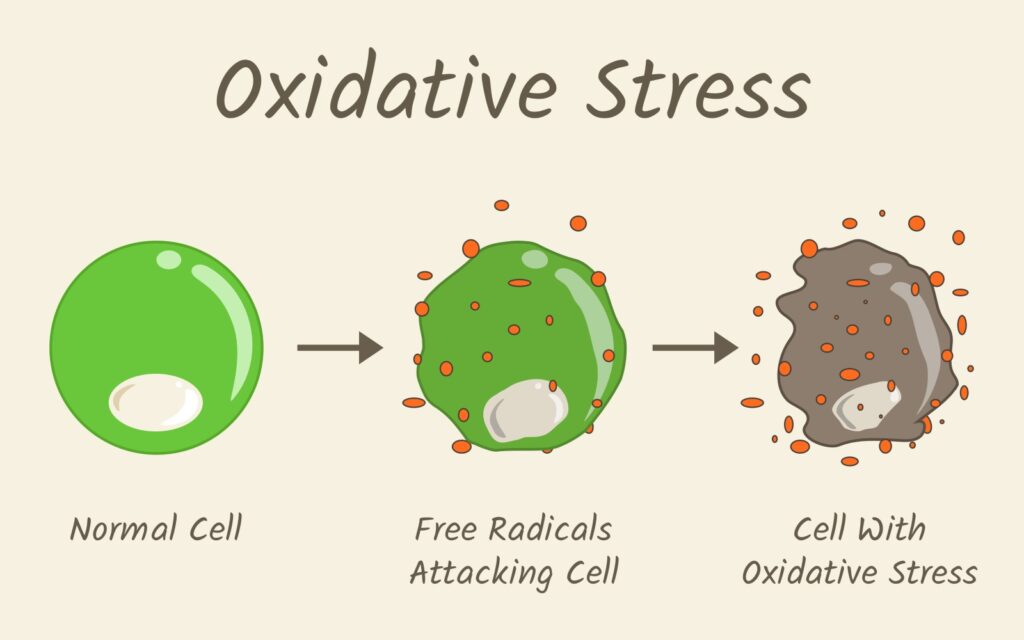
Eating The Rainbow
Include a diverse range of colourful fruits and vegetables in your diet to maximize your intake of dietary antioxidants. Vitamins C and E are particularly significant for their antioxidant and anti-inflammatory properties. [36]
Polyphenols, inherent in plants, exhibit anti-inflammatory and antioxidant characteristics [37]. Vibrantly coloured plant-based foods, including beans, grapes, and oranges, boast some of the highest polyphenol content. [38]
Take Supplements With Antioxidant Properties
Numerous cognitive-enhancing supplements (nootropics) showcase antioxidant properties, safeguarding neurons and mitochondria from oxidative stress. Additionally, these supplements may aid in restoring mitochondrial function following interference from oxidative stress or other contributing factors.
7. Addictive Habits
Smoking is prevalent in the general population and has adverse effects on overall health. It elevates oxidative stress levels and subjects individuals to numerous toxic substances.
Smoking is associated with conditions such as anxiety, dementia, and Alzheimer’s disease. Additionally, both smoking and other addictions have a tendency to interfere with dopamine pathways [39][40][41].
Alcohol is neurotoxic.[42] It can also increase oxidative stress and disturb your sleep.[43][44] Drinking can shape your brain and can be bad for the following aspects of brain function:
• Learning ability
• Memory
• Focus
• Behavioural control
• Visuospatial processing
• Psychomotor speed[45]
Finally, screen time contributes to the compromise of optimal brain functioning. Prolonged engagement with social media, exposure to blue light, and extensive hours spent playing video games can have adverse effects on your mental and brain health. Endeavor to minimize your screen time to enhance your brain function.

8. Sedentary Lifestyle
We’ve emphasized the significance of maintaining a healthy and balanced lifestyle for your brain. Physical activity boosts brain-derived neurotrophic factors, crucial for mood, cognitive function, and the deceleration of brain aging.
Therefore, a sedentary lifestyle, especially sitting a lot, is bad for your brain [46]
Consistent physical exercise provides neuroprotective benefits and lowers the risk of conditions such as depression, Alzheimer’s disease [47], Parkinson’s disease, dementia, and chronic stress. Additionally, it enhances the quality of your sleep. [48]
Participating in physical activity aids your body in eliminating toxins and enhancing the functions of various organs. Any form of physical activity, be it hiking or simply taking a walk, is highly advantageous for your overall well-being.
Conclusion
The contemporary dietary and lifestyle factors that deviate from natural patterns are detrimental to your brain. While many of these aspects are inevitable for our survival, especially if we aim to lead fulfilling and happy lives, they still pose challenges to our overall well-being.
Alongside mindfulness and a healthy lifestyle, supplements and biohacks offer a means to sustain a healthy brain and thrive despite the challenges posed by various factors. These interventions address deficiencies and alleviate the adverse effects of unhealthy modern-day influences. Simultaneously, nootropics can contribute to enhancing mood and cognition.
References
- Mental health. Who.int. Accessed April 10, 2022. https://www.who.int/health-topics/mental-health
- van der Velden PG, Contino C, Das M, van Loon P, Bosmans MWG. Anxiety and depression symptoms, and lack of emotional support among the general population before and during the COVID-19 pandemic. A prospective national study on prevalence and risk factors. J Affect Disord. 2020;277:540-548. doi:10.1016/j.jad.2020.08.026
- Shah AA, Beinecke RH. Global mental health needs, services, barriers, and challenges. Int J Ment Health. 2009;38(1):14-29. doi:10.2753/imh0020-7411380102
- Coping with stress. Cdc.gov. Published March 25, 2022. Accessed April 10, 2022. https://www.cdc.gov/mentalhealth/stress-coping/cope-with-stress/index.html
- Lopatina OL, Panina YA, Malinovskaya NA, Salmina AB. Early life stress and brain plasticity: from molecular alterations to aberrant memory and behavior. Rev Neurosci. 2021;32(2):131-142. doi:10.1515/revneuro-2020-0077
- van de Wouw M, Boehme M, Lyte JM, et al. Short-chain fatty acids: microbial metabolites that alleviate stress-induced brain-gut axis alterations: SCFAs alleviate stress-induced brain-gut axis alterations. J Physiol. 2018;596(20):4923-4944. doi:10.1113/jp276431
- Grigoruţă M, Martínez-Martínez A, Dagda RY, Dagda RK. Psychological stress phenocopies brain mitochondrial dysfunction and motor deficits as observed in a Parkinsonian rat model. Mol Neurobiol. 2020;57(4):1781-1798. doi:10.1007/s12035-019-01838-9
- Andersen ZJ, Pedersen M, Weinmayr G, et al. Long-term exposure to ambient air pollution and incidence of brain tumor: the European Study of Cohorts for Air Pollution Effects (ESCAPE). Neuro Oncol. 2018;20(3):420-432. doi:10.1093/neuonc/nox163
- Costa LG, Cole TB, Dao K, Chang YC, Garrick JM. Developmental impact of air pollution on brain function. Neurochem Int. 2019;131(104580):104580. doi:10.1016/j.neuint.2019.104580
- Sunyer J, Dadvand P. Pre-natal brain development as a target for urban air pollution. Basic Clin Pharmacol Toxicol. 2019;125 Suppl 3(S3):81-88. doi:10.1111/bcpt.13226
- Mortamais M, Gutierrez LA, de Hoogh K, et al. Long-term exposure to ambient air pollution and risk of dementia: Results of the prospective Three-City Study. Environ Int. 2021;148(106376):106376. doi:10.1016/j.envint.2020.106376
- Ahmmed MK, Ahmmed F, Tian HS, Carne A, Bekhit AED. Marine omega-3 (n-3) phospholipids: A comprehensive review of their properties, sources, bioavailability, and relation to brain health. Compr Rev Food Sci Food Saf. 2020;19(1):64-123. doi:10.1111/1541-4337.12510
- Bourre JM. Roles of unsaturated fatty acids (especially omega-3 fatty acids) in the brain at various ages and during ageing. J Nutr Health Aging. 2004;8(3):163-174.
- Rajizadeh A, Mozaffari-Khosravi H, Yassini-Ardakani M, Dehghani A. Effect of magnesium supplementation on depression status in depressed patients with magnesium deficiency: A randomized, double-blind, placebo-controlled trial. Nutrition. 2017;35:56-60. doi:10.1016/j.nut.2016.10.014
- Schwalfenberg GK, Genuis SJ. The importance of magnesium in clinical healthcare. Scientifica (Cairo). 2017;2017:4179326. doi:10.1155/2017/4179326
- Bekdash RA. Choline and the brain: An epigenetic perspective. Adv Neurobiol. 2016;12:381-399. doi:10.1007/978-3-319-28383-8_21
- Bekdash RA. Neuroprotective effects of choline and other methyl donors. Nutrients. 2019;11(12):2995. doi:10.3390/nu11122995
- Zeisel SH, da Costa KA. Choline: an essential nutrient for public health. Nutr Rev. 2009;67(11):615-623. doi:10.1111/j.1753-4887.2009.00246.x
- He W, Wu G. Metabolism of amino acids in the brain and their roles in regulating food intake. Adv Exp Med Biol. 2020;1265:167-185. doi:10.1007/978-3-030-45328-2_10
- Mariotti F, Gardner CD. Dietary protein and amino acids in vegetarian diets-A review. Nutrients. 2019;11(11):2661. doi:10.3390/nu11112661
- Mikkelsen K, Stojanovska L, Apostolopoulos V. The effects of vitamin B in depression. Curr Med Chem. 2016;23(38):4317-4337.
- Jessen NA, Munk ASF, Lundgaard I, Nedergaard M. The glymphatic system: A beginner’s guide. Neurochem Res. 2015;40(12):2583-2599. doi:10.1007/s11064-015-1581-6
- Walker MP, Stickgold R. Sleep-dependent learning and memory consolidation. Neuron. 2004;44(1):121-133. doi:10.1016/j.neuron.2004.08.031
- Galván A. The need for sleep in the adolescent brain. Trends Cogn Sci. 2020;24(1):79-89. doi:10.1016/j.tics.2019.11.002
- Kamphuis J, Meerlo P, Koolhaas JM, Lancel M. Poor sleep as a potential causal factor in aggression and violence. Sleep Med. 2012;13(4):327-334. doi:10.1016/j.sleep.2011.12.006
- Cheng W, Rolls ET, Ruan H, Feng J. Functional connectivities in the brain that mediate the association between Depressive Problems and sleep quality. JAMA Psychiatry. 2018;75(10):1052-1061. doi:10.1001/jamapsychiatry.2018.1941
- Xie W, Berry A, Lustig C, Deldin P, Zhang W. Poor sleep quality and compromised visual working memory capacity. J Int Neuropsychol Soc. 2019;25(6):583-594. doi:10.1017/S1355617719000183
- Ju YES, Lucey BP, Holtzman DM. Sleep and Alzheimer disease pathology–a bidirectional relationship. Nat Rev Neurol. 2014;10(2):115-119. doi:10.1038/nrneurol.2013.269
- Irwin MR. Sleep and inflammation: partners in sickness and in health. Nat Rev Immunol. 2019;19(11):702-715. doi:10.1038/s41577-019-0190-z
- Atrooz F, Salim S. Sleep deprivation, oxidative stress and inflammation. Donev R, ed. Adv Protein Chem Struct Biol. 2020;119:309-336. doi:10.1016/bs.apcsb.2019.03.001
- Antoniadis EA, Ko CH, Ralph MR, McDonald RJ. Circadian rhythms, aging and memory. Behav Brain Res. 2000;111(1-2):25-37. doi:10.1016/s0166-4328(00)00145-5
- Jones DP. Redefining oxidative stress. Antioxid Redox Signal. 2006;8(9-10):1865-1879. doi:10.1089/ars.2006.8.1865
- Guo C, Sun L, Chen X, Zhang D. Oxidative stress, mitochondrial damage and neurodegenerative diseases. Neural Regen Res. 2013;8(21):2003-2014. doi:10.3969/j.issn.1673-5374.2013.21.009
- Vila J, Gemma C, Bachstetter A, Bickford P. Oxidative stress and the aging brain: From theory to prevention. In: Brain Aging. Vol 384. CRC Press; 2007:353-374.
- Maciejczyk M, Żebrowska E, Chabowski A. Insulin resistance and oxidative stress in the brain: What’s new? Int J Mol Sci. 2019;20(4):874. doi:10.3390/ijms20040874
- Iddir M, Brito A, Dingeo G, et al. Strengthening the immune system and reducing inflammation and oxidative stress through diet and nutrition: Considerations during the COVID-19 crisis. Nutrients. 2020;12(6):1562. doi:10.3390/nu12061562
- Silva RFM, Pogačnik L. Polyphenols from food and natural products: Neuroprotection and safety. Antioxidants (Basel). 2020;9(1):61. doi:10.3390/antiox9010061
- Zielinsky P, Piccoli AL Jr, Manica JLL, Nicoloso LHS. New insights on fetal ductal constriction: role of maternal ingestion of polyphenol-rich foods. Expert Rev Cardiovasc Ther. 2010;8(2):291-298. doi:10.1586/erc.09.174
- Moylan S, Jacka FN, Pasco JA, Berk M. How cigarette smoking may increase the risk of anxiety symptoms and anxiety disorders: a critical review of biological pathways. Brain Behav. 2013;3(3):302-326. doi:10.1002/brb3.137
- Boksa P. Smoking, psychiatric illness and the brain. J Psychiatry Neurosci. 2017;42(3):147-149. doi:10.1503/jpn.170060
- Kollins SH, Adcock RA. ADHD, altered dopamine neurotransmission, and disrupted reinforcement processes: Implications for smoking and nicotine dependence. Progress in Neuro-Psychopharmacology and Biological Psychiatry. 2014;52:70-78. doi:10.1016/j.pnpbp.2014.02.002
- Harper C. The neurotoxicity of alcohol. Hum Exp Toxicol. 2007;26(3):251-257. doi:10.1177/0960327107070499
- Das SK, Vasudevan DM. Alcohol-induced oxidative stress. Life Sci. 2007;81(3):177-187. doi:10.1016/j.lfs.2007.05.005
- Stein MD, Friedmann PD. Disturbed sleep and its relationship to alcohol use. Subst Abus. 2005;26(1):1-13. doi:10.1300/j465v26n01_01
- Lees B, Meredith LR, Kirkland AE, Bryant BE, Squeglia LM. Effect of alcohol use on the adolescent brain and behavior. Pharmacol Biochem Behav. 2020;192(172906):172906. doi:10.1016/j.pbb.2020.172906
- Wheeler MJ, Dempsey PC, Grace MS, et al. Sedentary behavior as a risk factor for cognitive decline? A focus on the influence of glycemic control in brain health. Alzheimers Dement (N Y). 2017;3(3):291-300. doi:10.1016/j.trci.2017.04.001
- Meeusen R. Exercise and the brain. In: Proceedings 13th ISEI Symposium – Training Our Immune System for Health and Performance. ; 2017:24-28.
- Alkadhi KA. Exercise as a positive modulator of brain function. Mol Neurobiol. 2018;55(4):3112-3130. doi:10.1007/s12035-017-0516-4

